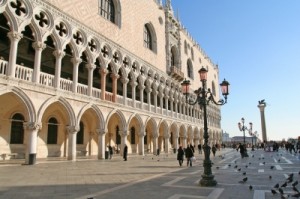Traditional Mediterranean Food for Thought
From Rome to Romanian: Mediterranean Culture Meets Eastern European Health Practices
For centuries, the traditional diet and lifestyle in countries around the Mediterranean Sea – parts of Italy, Greece, France, Spain, Portugal, and northern Africa – have helped the beneficiaries of this naturally healthy way of life to stave off obesity, cardiovascular disease, diabetes, and other degenerative diseases and symptoms of aging.
Many people are surprised to learn that an equally old and wonderfully complex Mediterranean tradition exists in my native Romania. The long intermingling of indigenous peoples with settlers from the Greco-Roman and Ottoman Empires has enriched Romania's national identity and culture with its own unique version of the Mediterranean spirit.
 Romanian Holiday: The Original Club Med on the Shores of the Black SeaPerhaps the most famous legacy of early Roman colonists is Romania's enduring reputation as the Mediterranean World's original vacation hotspot. Ever since Roman colonists first capitalized on the local custom of bathing in the mineral-rich waters by building the country's first health resorts, Romanian spa hotels have been famous as fashionable retreats for Europe's ailing, tired, and bored elite.
What made these summer getaways so popular with sophisticated Europeans was the Old World elegance of the Romanian spa experience. Instead of submitting to a rigorously ascetic health regime, the rich and pampered could restore their physical, mental, and emotional equilibrium while also indulging their taste for luxury and sensual pleasure. Even today, Romania's sultry summer weather, lush vineyards, and long stretches of fine white sand continue to draw favorable comparisons to the French and Italian Riviera.
Romanian Holiday: The Original Club Med on the Shores of the Black SeaPerhaps the most famous legacy of early Roman colonists is Romania's enduring reputation as the Mediterranean World's original vacation hotspot. Ever since Roman colonists first capitalized on the local custom of bathing in the mineral-rich waters by building the country's first health resorts, Romanian spa hotels have been famous as fashionable retreats for Europe's ailing, tired, and bored elite.
What made these summer getaways so popular with sophisticated Europeans was the Old World elegance of the Romanian spa experience. Instead of submitting to a rigorously ascetic health regime, the rich and pampered could restore their physical, mental, and emotional equilibrium while also indulging their taste for luxury and sensual pleasure. Even today, Romania's sultry summer weather, lush vineyards, and long stretches of fine white sand continue to draw favorable comparisons to the French and Italian Riviera.
 Classic Food for Thought: 5 Tips for Nurturing Slim, Youthful Looks
The long, hot month of August is the perfect time to cultivate the health and beauty benefits of a traditional Romanian spa vacation. The following Old World health and dietary practices will provide you with the fundamental building blocks for healthier relationship with food and a more elegant and relaxed way of life.
1. Add more plant-derived foods to your diet. Fresh fruits and vegetables, grains, beans and other legumes, and nuts are the primary food sources in traditional European diets. Rich in antioxidants including vitamins A, C, and E vitamins, phytonutrients, and omega-3 oils, these cuisines are great for your waistline, your heart and circulatory system, as well as your complexion.
2. Avoid processed foods and takeout. Make yourself a nutritious meal from fresh ingredients instead. Of course, we all have days that broiling a chicken breast or even cooking a simple omelet can seem overwhelming. That's why it's smart to keep the fridge stocked with a mix of healthful foods that can be combined in a balanced meal. Here are some options:
a. Hummus or yogurt (the real fermented kind!) with raw vegetables/whole grain pita bread
b. Dark greens, fresh or leftover cooked vegetables with some nuts or cheese for protein
c. An inventive sandwich like this Greek salad on a bun.
3. Take time to savor your food. Multitasking at mealtimes not only diminishes the pleasure of eating but also encourages rapid, mindless consumption of too many calories. Do your digestion, your figure, and your senses a favor. Stop eating on the run or out of a carton standing in front of the refrigerator – and turn off the TV. Set the table as you would for an honored guest. Arrange your food nicely on a plate, down at the table, and pay attention to the interplay of tastes, aromas, and textures that make a meal delightful sensory experience. After you've finished eating, contemplate a vase of flowers or listen to soothing Classical music as you sip a glass of wine or a cup of tea. In Romania, this is our version of meditation!
Classic Food for Thought: 5 Tips for Nurturing Slim, Youthful Looks
The long, hot month of August is the perfect time to cultivate the health and beauty benefits of a traditional Romanian spa vacation. The following Old World health and dietary practices will provide you with the fundamental building blocks for healthier relationship with food and a more elegant and relaxed way of life.
1. Add more plant-derived foods to your diet. Fresh fruits and vegetables, grains, beans and other legumes, and nuts are the primary food sources in traditional European diets. Rich in antioxidants including vitamins A, C, and E vitamins, phytonutrients, and omega-3 oils, these cuisines are great for your waistline, your heart and circulatory system, as well as your complexion.
2. Avoid processed foods and takeout. Make yourself a nutritious meal from fresh ingredients instead. Of course, we all have days that broiling a chicken breast or even cooking a simple omelet can seem overwhelming. That's why it's smart to keep the fridge stocked with a mix of healthful foods that can be combined in a balanced meal. Here are some options:
a. Hummus or yogurt (the real fermented kind!) with raw vegetables/whole grain pita bread
b. Dark greens, fresh or leftover cooked vegetables with some nuts or cheese for protein
c. An inventive sandwich like this Greek salad on a bun.
3. Take time to savor your food. Multitasking at mealtimes not only diminishes the pleasure of eating but also encourages rapid, mindless consumption of too many calories. Do your digestion, your figure, and your senses a favor. Stop eating on the run or out of a carton standing in front of the refrigerator – and turn off the TV. Set the table as you would for an honored guest. Arrange your food nicely on a plate, down at the table, and pay attention to the interplay of tastes, aromas, and textures that make a meal delightful sensory experience. After you've finished eating, contemplate a vase of flowers or listen to soothing Classical music as you sip a glass of wine or a cup of tea. In Romania, this is our version of meditation!
 4. Stick with high-quality foods. This rule applies to splurges as well as dietary staples. Cheap store brand desserts and snacks that are full of trans fat and chemicals are not only unhealthy, but also pretty unappetizing compared to treats made with real ingredients. Low-fat foods can be equally deadly. Most diet desserts and snack foods are overloaded with sugar to compensate for the lack of fat, which makes them both unsatisfying and addictive.
5. Maintain a healthy lifestyle, but give yourself a break now and then. Eat moderate portions of nutrient-dense foods and exercise regularly. But keep in mind that an ice cream cone on a hot day or skipping the gym to have coffee with a friend isn't going to make you fat and flabby overnight.
A Balanced Anti-Aging Prescription for Extreme Times
Over the past 30 years, economic and social changes in many European countries have brought not only the advantages of modern life but also the health problems associated with America's high-stress fast food culture. That is not to say we all should throw away our modern conveniences and move to a cabin in the woods. Instead of going to extremes, find a comfortable middle ground. Choose the traditional health practices and 21st scientific principles that fit your lifestyle, physical condition, and personal goals to create a disciplined but flexible plan for living a long and beautiful life.
4. Stick with high-quality foods. This rule applies to splurges as well as dietary staples. Cheap store brand desserts and snacks that are full of trans fat and chemicals are not only unhealthy, but also pretty unappetizing compared to treats made with real ingredients. Low-fat foods can be equally deadly. Most diet desserts and snack foods are overloaded with sugar to compensate for the lack of fat, which makes them both unsatisfying and addictive.
5. Maintain a healthy lifestyle, but give yourself a break now and then. Eat moderate portions of nutrient-dense foods and exercise regularly. But keep in mind that an ice cream cone on a hot day or skipping the gym to have coffee with a friend isn't going to make you fat and flabby overnight.
A Balanced Anti-Aging Prescription for Extreme Times
Over the past 30 years, economic and social changes in many European countries have brought not only the advantages of modern life but also the health problems associated with America's high-stress fast food culture. That is not to say we all should throw away our modern conveniences and move to a cabin in the woods. Instead of going to extremes, find a comfortable middle ground. Choose the traditional health practices and 21st scientific principles that fit your lifestyle, physical condition, and personal goals to create a disciplined but flexible plan for living a long and beautiful life.
